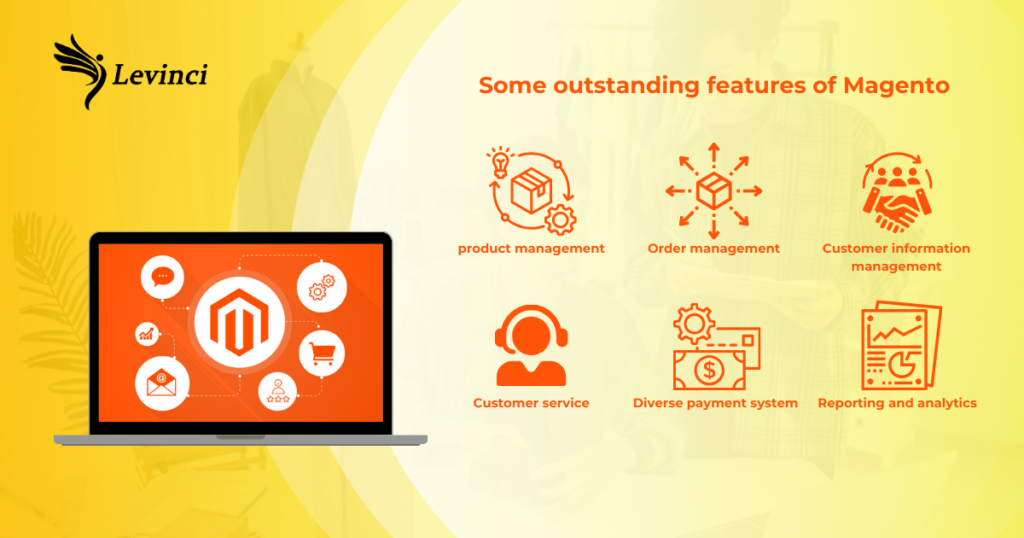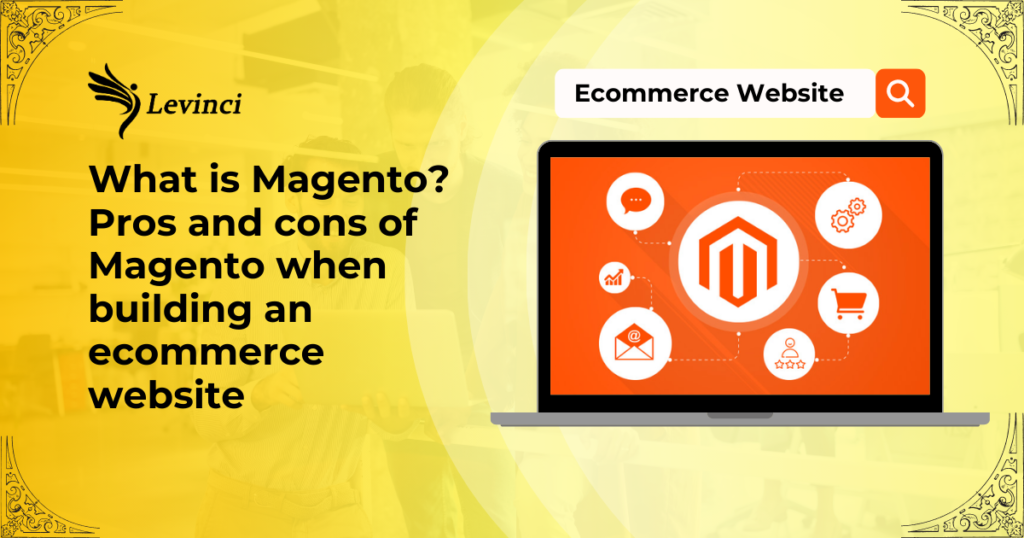In the booming era of e-commerce, owning an online sales website helps businesses reach potential customers and increase sales. However, choosing the right platform to build an e-commerce website can be a big question mark. Among popular options, Magento emerges as a powerful solution, trusted by many large and small businesses globally. So what is Magento? What are the advantages and disadvantages? Let’s find out with Levinci!
What is Magento?

Magento is an open source platform written in the PHP programming language based on the Zend Framework and MySQL database. Magento is used to build online sales websites with all the necessary functions, allowing businesses to sell products and services to customers conveniently and quickly. Magento is known for its flexibility, scalability, and robustness, suitable for both small and large businesses.
Most popular Magento types
Currently, there are two most popular Magento versions widely used:
- Magento 2 Community Edition (CE) (also known as Magento Open Source), is an open source e-commerce software that allows completely free download and use but will be limited in some features and libraries. Therefore, Magento 2 Community Edition is a popular choice for small and medium-sized businesses just getting started with e-commerce, or for those who want to easily modify, customize and distribute the source code as they wish.
- Magento 2 Enterprise Edition (EE), also known as Magento 2 Commerce, is the premium paid version of the Magento e-commerce platform. This is a comprehensive solution for large businesses and corporations with strict business needs, high traffic volume and requirements for many advanced features.
Some outstanding features of Magento

Magento offers a comprehensive range of features to build and manage an effective e-commerce website. Let’s take a look at some outstanding features of Magento below:
- Product Management: Magento allows you to create and manage product catalogs with multiple attributes and images; categorizing products into categories and subgroups makes it easy to search and select products based on available categories; Manage warehouse and monitor the number of imported, exported and inventory products.
- Order management: Receive and process online orders; send order confirmation notifications to customers; track order status and update customers; Export order reports and sales data.
- Customer information management: Understand customer account status and address; previous transactions; cart,…
- Customer service: Provide a comprehensive customer support and tracking system, send marketing emails and promotional information to customers;…
- Diverse payment system: Supports many popular payment methods such as Paypal, Visa, Mastercard, etc.
- Reporting and analytics: Integrates with Google Analytics to provide a wealth of detailed data on sales, customers, products, and traffic; Analyze data to better understand customer behavior and optimize website performance.
In addition, Magento also has many other advanced features such as: Multi-language and multi-currency support; Manage multiple sites from one admin interface; Supports quick search on Google SiteMap.
Advantages and disadvantages of Magento

Magento is a popular e-commerce platform used by many large and small businesses around the world. However, before deciding to use Magento, you should carefully consider both its advantages and disadvantages.
Advantage
- Large ecosystem: This is one of the reasons why Magento has become a popular choice for businesses around the world. You can completely customize the themes and integrate many 3rd party extensions to use. Besides, Magento is also continuously improved to be more user-friendly, helping businesses easily integrate other important features such as accounting, payment gateways, CRM, or ERP systems.
- High flexibility: When using Magento, businesses can apply many different concepts of an e-commerce site, making it easier for admins to manage. Depending on different product lines, Magento will build corresponding features.
- High security capabilities: Magento is highly appreciated by many experts and customers for its security capabilities as well as the level of safety of information and data. Therefore, businesses can minimize information leakage or data loss.
- Effective SEO support: Magento has powerful SEO tools that help you easily attract natural traffic to your website, easily reaching potential customers. Besides, Magento also automatically updates HTML and XML sitemaps to help increase efficiency in website indexing.
Disadvantages
- High cost: As mentioned in the previous content, Magento has two main versions: Community Edition (free) and Enterprise Edition (paid). Enterprise Edition costs more, ranging from $24,000 to $40,000 per year, depending on your annual revenue. In addition, other costs such as system design, installation, deployment and maintenance are also higher than other platforms due to complexity and high expertise requirements.
- The implementation process is time-consuming: To successfully deploy a complete Magento project can take from 3 months to 1 year. Long implementation time also requires human resources and high costs due to having to pay for design, integration, programming, etc.
- Strict requirements for the storage system: Magento is a heavy platform, requiring businesses to prepare a correspondingly highly configured storage system to ensure operational efficiency.
Conclusion
Magento offers a comprehensive and powerful set of features to build and manage an effective e-commerce website. With high customization capabilities and a large support community, Magento is the right choice for businesses of all sizes.
With more than 10 years of experience, Levinci is proud to be one of the most comprehensive and quality Magento development units. From analysis and design to operation and maintenance, Levinci focuses thoroughly on quality and customer satisfaction. If you want to deploy Magento, contact Levinci now!

